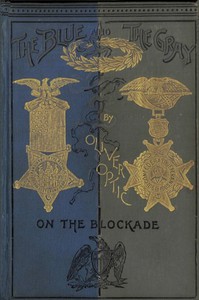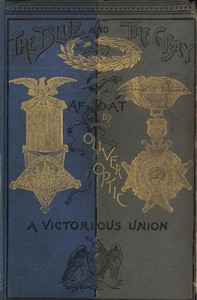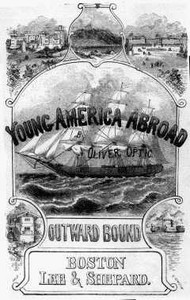On The Blockade, Oliver Optic [best affordable ebook reader txt] 📗

- Author: Oliver Optic
Book online «On The Blockade, Oliver Optic [best affordable ebook reader txt] 📗». Author Oliver Optic
Six bells struck on deck, and all the officers, including the captain, adjourned to the bridge, which was a useful institution on such occasions as the present. A sharp watch had been kept by Lieutenant Flint in charge; but though the night was clear, nothing had been made out in the direction of the shore. All lights on board had been put out, and the Bronx went along in the smooth sea as quietly as a lady on a fashionable promenade, and it was not believed that anything could be seen of her from the shore.
About midnight the lookout man aloft reported that he could see a twinkling light. It was promptly investigated by Mr. Amblen, who went aloft for the purpose. He was satisfied that it was a light in some house in the village, probably in the upper story. It soon disappeared, and it was thought to be occasioned by the late retiring of some person.
"I should say, Captain Blowitt, that we are not more than five miles outside of Seahorse Key," said Mr. Amblen, after he had interpreted the 254 meaning of the light. "It is after midnight, and these people are not in the habit of sitting up so late."
"If they are shipping much cotton from this port, it is not improbable that there is a force here to protect the vessels, whatever they are," added the commander.
"Of that, of course, I can know nothing; but I shall expect to find a Confederate battery somewhere on the point, and I know about where to look for it."
"The place has never been of any great importance, and you can hardly expect to find a very strong force in it," added the captain.
It has since become a place of more note, both as a resort for invalids and pleasure-seekers, and as the termination of the railroad from Fernandina and Jacksonville, and steamers have run regularly from the port to Havana and New Orleans.
"If you will excuse me, Captain Blowitt, I should say that it was not advisable to take the Bronx nearer than within about four miles of the Seahorse Key," suggested Mr. Amblen.
"I was just thinking that we had gone as far as 255 it is prudent to go. Do you think you could take the Bronx up to the landing?" added the captain.
"I am very sure that I could, for I have been in many a time on a darker night than this."
"We will not go in to-night, but perhaps we may have occasion to do so to-morrow. We shall know better what to do when we get a report of the state of things in the place," replied the captain, as he gave the word through the speaking tube to stop the steamer.
Christy had been given full powers to make all preparations for the boat expedition, and was allowed ten men to each of the quarter boats. He had selected the ones for his own boat, and had required Flint to pick his own crew for the other. The oars had been carefully muffled by the coxswains, for it was desirable that no alarm should be given in the place. The starboard quarter boat was the first cutter, pulled by six oars, and this was for Christy and Mr. Amblen, with the regular coxswain and three hands in the bow. The second cutter was in charge of Mr. Flint, and followed the other boat, keeping near enough to obtain her course in the twists of the channel.
256 It was a long pull to the Seahorse Key, and a moderate stroke was taken as well not to tire the men as to avoid all possible noise. When the first cutter was abreast of the Key, the pilot pointed out the dark outline of the peninsula, which was less than a mile distant. No vessel could be seen; but the pilot thought they might be concealed by the railroad buildings on the point. Christy asked where the battery was which the pilot thought he could locate, and the spot was indicated to him. Christy wanted a nearer view of it, and the cutter was headed in that direction.
257 CHAPTER XXIII THE VISIT TO A SHORE BATTERYThe first cutter reached the Seahorse Key closely followed by the second. It was within an hour of high tide, the ordinary rise and fall of which was two and a half feet. On the Key was a light house, and a cottage for the keeper of it; but the former was no longer illuminated, and the house was as dark as the head of the tower. So far as could be discovered there was no one on the Key, though the boats did not stop to investigate this matter. The crews still pulled a moderate stroke with their muffled oars, the men were not allowed to talk, and everything was as silent as the inside of a tomb.
The pilot stood up in the stern sheets of the cutter, gazing intently in the direction of the point nearly a mile ahead. The outlines of the buildings could be discerned, and Amblen soon declared that he could make out the tops of the 258 masts of several vessels to the westward of the point with which the peninsula terminated. This looked hopeful, and indicated that the information upon which the expedition had been sent out was correct. Christy began to think he should have a busy night before him when Amblen said there were at least three vessels at the port.
The battery was first to be visited and cared for if there was one, and it was not probable that a place so open to the operations of the blockading force would be without one, especially if the people were actually engaged in loading cotton, as the masts of the vessels indicated, though the hulls could not yet be seen. As the first cutter approached nearer to the place the outlines became more distinct, and soon embodied themselves into definite objects. Both officers in the stern sheets watched with the most anxious vigilance for any moving object denoting the presence of life and intelligence.
As the boats came nearer to the shore, a breeze sprang up, and cooled the air, for early as it was in the season, the weather was very warm, and it was not uncommon for the thermometer to rise above ninety. These breezes were usually present 259 to cool the nights, and doubtless the inhabitants slept the sounder for the one which had just begun to fan the cheeks of the officers and seamen of the expedition.
"There is a battery there, Mr. Passford," said the pilot in a very low tone. "I can make it out now, and it is just where I supposed it would be."
"I can see something that seems like an earthwork at the right of the buildings," added Christy. "Can you make out anything that looks like a sentinel?"
"I can see nothing that denotes the presence of a man. If there were a sentinel there, he would be on the top of the earthwork, or on the highest ground about it, so that he could see out into the bay, for there can be no danger from the land side of the place," added Amblen.
"I can hardly imagine such a thing as a battery without a sentinel to give warning if anybody should try to carry it off. There must be a sentry somewhere in the vicinity."
"I can't say there isn't, though I can't make out a man, or anything that looks like one," replied the pilot.
"Very likely we shall soon wake him up, Mr. 260 Amblen; and in that case it will be necessary for us to find a safer place than in front of the guns of the battery, for I do not feel at liberty to expose the men to the fire of the works, whatever they are."
"All you have to do is to pull around to the other side of the point into the bay, where the vessels are. I am confident there is no battery on that side, and there can hardly be any need of one, for this one commands the channel, the only approach to the place for a vessel larger than a cutter."
"I fancy this battery does not amount to much, and is probably nothing more than an earthwork, with a few field guns behind it. Suppose we should wake it up, and have to make for the bay, can we get out of it without putting the boats under the guns of the battery?"
"Without any difficulty at all, sir. We have only to pull around the North Key, and pass out to the Gulf, beyond the reach of any field gun that can be brought to bear on us," replied Mr. Amblen.
"If they have one or two field batteries here, they may hitch on the horses, and follow us," suggested Christy, who, in spite of the audacity with 261 which he had been mildly charged, was not inclined to run into any trap from which he could not readily withdraw his force.
"We shall have the short line, and if they pursue us with the guns, we can retire by the way of the channel, which they will leave uncovered."
"We are getting quite near the shore," continued Christy. "How is the water under us?"
"The bottom is sandy, and we shall take the ground before we reach the shore if we don't manage properly. But we can tell something by the mangroves that fringe the land," replied the pilot; "and I will go into the bow of the cutter and look out for them."
Mr. Amblen made his way to the fore sheets, and asked Boxie, who was there, for the boathook, with which he proceeded to sound. When he had done so, he raised both his hands to a level with his shoulders, which was the signal to go ahead, and the men pulled a very slow stroke. He continued to sound, after he had selected the point for landing.
When the first cutter was within three lengths of the shore, he elevated both his hands above his head, which was the signal to cease rowing, though 262 the two bow oarsmen kept their oars in the water instead of boating them as the others did. Mr. Amblen continued to feel the way, and in a few minutes more, aided by the shoving of the two bow oarsmen, he brought the boat to the shore.
Then he gave his attention to the second cutter, bringing it to the land alongside of the first. Stepping out on the sand himself, he was followed by all the crew, with cutlass in hand, and revolvers in readiness for use. The men were placed in order for an advance, and then required to lie down on the sand, so that they could not readily be seen if any stroller appeared on the ground.
Leaving the force in charge of Mr. Flint, Christy and Amblen walked towards the battery, crouching behind such objects as they could find that would conceal them in whole or in part. The earthwork was semicircular in form, and was hardly more than a rifle pit. No sentinel could be discovered, and getting down upon the sand, the two officers crept cautiously towards the heaps of sand which formed the fort.
Christy climbed up the slope with some difficulty, for the dry sand afforded a very weak foothold. On the top of it, which was about six feet 263 wide, they found a solid path which had evidently been a promenade for sentinels or other persons. Behind it, on a wooden platform, were four field guns, with depressions in the earthwork in front of the muzzles.
Christy led the way down the slope on the inside to the pieces, which were twelve-pounders. At a little distance





Comments (0)